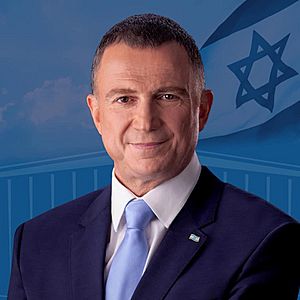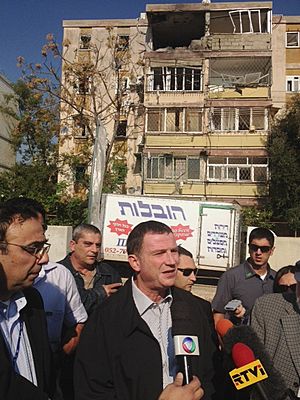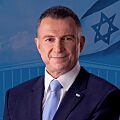Yuli Edelstein facts for kids
Quick facts for kids
Yuli Edelstein
|
|
|---|---|

Official portrait, 2019
|
|
| Ministerial roles | |
| 1996–1999 | Minister of Immigrant Absorption |
| 2009–2013 | Minister of Information & Diaspora |
| 2020–2021 | Minister of Health |
| Faction represented in the Knesset | |
| 1996–2003 | Yisrael BaAliyah |
| 2003–2006 | Likud |
| 2007– | Likud |
| Other roles | |
| 2013–2020 | Speaker of the Knesset |
| Personal details | |
| Born |
Yulian Yur'evich Edelshtein
(Юлиан Юрьевич Эдельштейн} 5 August 1958 Chernivtsi, Ukrainian SSR, Soviet Union |
| Spouses |
Tatiana Freivort
(m. 1981; died 2014)Irina Nevzlin
(m. 2016) |
| Children | 2 |
| Relatives | Leonid Nevzlin (father-in-law) |
| Residences | Neve Daniel, West Bank |
| Education | Moscow Pedagogical Institute (expelled) |
Yuli-Yoel Edelstein (Hebrew: יולי יואל אדלשטיין, Russian: Юлий Йоэль Эдельштейн; born 5 August 1958) is an Israeli politician. He served as the Speaker of the Knesset from 2013 to 2020. Later, he was the Minister of Health from 2020 to 2021. Before moving to Israel, he was a well-known refusenik in the Soviet Union. Refuseniks were people who were not allowed to leave the Soviet Union.
Contents
Early Life and Activism
Growing Up in the Soviet Union
Yuli Edelstein was born in 1958 in Chernivtsi, which was part of the Soviet Union (now Ukraine). He grew up in a Jewish family. His mother was Jewish, and his father, Yuri Edelstein, was the son of a Jewish father and Christian mother. Both of his parents later became Christians. His father is now a Russian Orthodox priest.
Yuli was raised by his grandparents. His grandfather learned Hebrew when he was 70 years old. He would listen to the Voice of Israel radio. After his grandfather passed away, Yuli started to learn Hebrew too. He read books like Exodus by Leon Uris.
Becoming a Refusenik
In 1977, when Yuli was in his second year of university, he wanted to move to Israel. He applied for an exit visa, but his request was denied. This made him a "refusenik." He then joined a small group of people who taught Hebrew in secret. They held classes in their homes.
In 1979, Yuli helped start an underground group called the 'City Project'. Their goal was to train Hebrew teachers and share materials for learning Hebrew. Because of these activities, he was expelled from university. He also faced problems with the KGB (the Soviet secret police) and local police. During this time, he worked odd jobs like a street cleaner.
Imprisonment and Release
Yuli Edelstein was arrested for his activities. He was sent to Siberian labor camps. He had to do hard labor there. He even broke several bones after falling from a construction tower.
He was finally released in May 1987. This was just before Israeli Independence Day. He was one of the last refuseniks to be freed. After his release, he moved to Israel. He settled in Alon Shvut, a community in the West Bank. He also served in the Israel Defense Forces, reaching the rank of Corporal.
Political Career in Israel
Starting in the Knesset
Yuli Edelstein began his political journey in Israel. He helped create the Yisrael BaAliyah party with another Soviet activist, Natan Sharansky. In 1996, he was elected to the Knesset, which is Israel's parliament.
He became the Minister of Immigrant Absorption. In this role, he helped new immigrants settle in Israel. He was re-elected in 1999. In 2001, he became the Deputy Immigrant Absorption Minister.
Joining the Likud Party
In 2003, his party, Yisrael BaAliyah, joined the Likud party. Yuli Edelstein kept his seat in the Knesset. Although he lost his seat briefly in 2006, he returned to the Knesset in 2007.
In 2009, he was appointed Minister of Information and Diaspora. He continued to be re-elected to the Knesset in later elections.
Speaker of the Knesset
In 2013, Yuli Edelstein was chosen to be the Speaker of the Knesset. This is a very important role, like the head of the parliament. He was elected with a large number of votes. He was re-elected as Speaker after the 2015 and April 2019 elections.
During his time as Speaker, he supported the Nation-State Bill. This law defines Israel as the nation-state of the Jewish people.
After the 2020 election, there was a disagreement about who should be the Speaker. Yuli Edelstein decided to resign from his position on March 25, 2020. He did this to avoid a major political problem.
After Being Speaker
After resigning as Speaker, Yuli Edelstein became the Minister of Health. He served in this role from May 2020 to June 2021. In 2022, he was again elected to the Knesset.
Important Statements
Yuli Edelstein has shared his views on various topics. In 2014, he spoke about the idea of a Palestinian state. He warned that it might lead to conflict with Israel.
However, in the same interview, he also said he believes Israelis and Palestinians can live together peacefully. He has spoken out against actions that he believes harm this coexistence. For example, he criticized an Arab-Israeli Member of Knesset for supporting Hamas. He said such actions hurt the idea of people living together.
He also criticized U.S. politician Bernie Sanders. Sanders had suggested that U.S. military aid to Israel should go to Palestinians in Gaza instead. Edelstein said Sanders should "stop talking nonsense."
More recently, in July 2024, he spoke about Israeli soldiers. Military police had visited a detention camp to question soldiers. Edelstein said that soldiers are not criminals and should not be treated that way.
Personal Life
Yuli Edelstein lives in Neve Daniel, a community in the West Bank. He was married to Tatiana (Tanya) Edelstein for 33 years. They met in the Soviet Union when she was his Hebrew student. After moving to Israel, Tanya worked as an engineer. They had two children together. Tanya passed away from cancer in 2014.
In June 2016, Yuli Edelstein married Irina Nevzlin. She is involved with The Museum of the Jewish People at Beit Hatfutsot.
Images for kids
See also
 In Spanish: Yuli Edelstein para niños
In Spanish: Yuli Edelstein para niños



